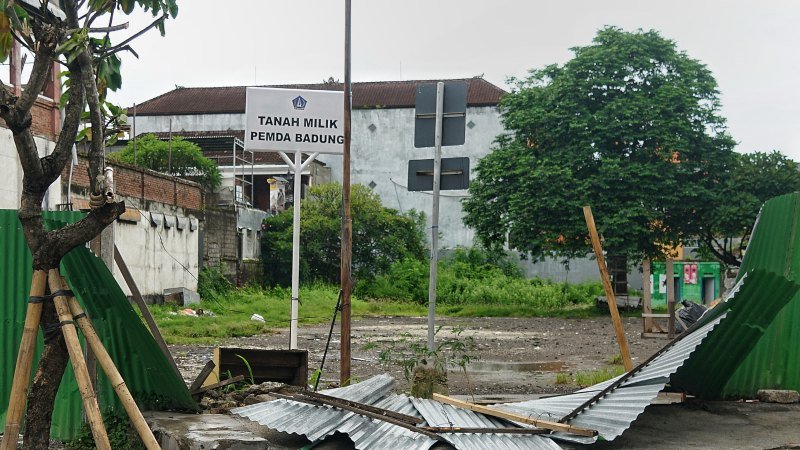Years of efforts by Australian and Indonesian families to transform the Bali bombing site into something befitting its significance have come to naught – until now.
Years of efforts by Australian and Indonesian families to transform the Bali bombing site into something befitting its significance have come to naught – until now.
By Zach Hope and Amilia Rosa
February 7, 2025 — 4.35am
What in the World, a free weekly newsletter from our foreign correspondents, is sent every Thursday. Below is an excerpt. Sign up to get the whole newsletter delivered to your inbox.
It’s no surprise to see the old Sari Club site in Bali pocked with refuse and thick at the edges with rainy season weeds. Or the green, street-facing corrugated iron fence buckled and dented.
Save for some good clean-ups over the years and frangipani-planting sessions, the place has been pretty bleak more or less since the Sari’s charred stumps were cleared following the 2002 Bali bombings, in which 202 people, including 88 Australians, died.

Motorcyclists used to park here. Partygoers, probably unaware of the history, ducked into the lot for all manner of drunken vulgarities. Presently, the best hint that this is sacred ground are the hand-painted cautions on the grimy perimeter walls: dilarang kencing di sini – No peeing here.
But there has been action at the site this year. Officials from the Badung Regency local government have cleared a couple of unsanctioned stalls and mounted a sign above the muddy puddles declaring that the land is now theirs.

The regency has previously backed creating a museum and gardens here, so it seems (though the disappointments have been many), something is going to happen. There is even talk of work beginning this year.
“A mini Bali – how Bali was before the bombing [and] a remembrance,” says architect Wayan Gomudha, who attended a meeting last March with the Badung Regency and peace park advocates, although he adds nothing is yet official.
It will not be a place to “dwell on the tragedy itself”, he muses, but a reminder of the need to “keep the peaceful Bali”. It will be a serene place to pray.
Advertisement
Loading
“After years of effort, finally, we are nearly at the end of our goal,” says survivor Thiolina Marpaung, head of an Indonesian victims and families group.
“Next, we wait for the Australian side to build it.”
It would be reasonable for Australia to build the infrastructure, especially given our government once offered to buy the land at commercial rates, but will it? The Albanese government says it holds all those affected “in our hearts” and welcomes Badung’s “plans to develop it into an appropriate space for reflection”.
However, when asked if it would contribute to the infrastructure, the Department of Foreign Affairs and Trade said it had nothing more to add.
A memorial listing the names of the dead sits between the Sari lot and the old Paddy’s Bar, the other major blast site.
While Paddy’s was commercially redeveloped long ago, the fate of the Sari block has been more complex.

It took the Badung government to end a stand-off with the Indonesian owners, who, at last count, asked the now-defunct Western Australia-based Bali Peace Park Association (BPPA) for an impossible $15 million.
The figure supposedly took in lost earnings for the many years that politics and various forms of pressure and expectation prevented redevelopment. The BPPA considered the price outrageous.
Loading
“They [the owners] thought as long as rich Australians were involved, they were going to get a lot of money, so they kept jacking the price up,” says Keith Pearce, a former member and now the treasurer of the new Bali Memorial Association (BMA).
It’s a tough critique. The owners of Paddy’s Bar promptly rebuilt and made their money, as they were entitled to do. The Sari owners, also sitting on prime Kuta land, did not.
Unfortunately, the $15 million was almost three times what had reportedly been discussed previously and three times what the Morrison government then had on the table. The deal fell through, and so did the BPPA.
“After 20-odd years of trying and not getting anywhere, the decision was made to change our name and change our constitution to show the owners that we were no longer interested, and then work with the Badung Regency to see if they would get involved, which they’ve now done,” Pearce says.
Loading
The local government secured the land for about $6 million late last year. A spokesman for owner Tjia Sukamto said there was no undue pressure to sell.
The sale is a good news story. But the journey has bred deep resentment between key Australian proponents.
It is messy and complex stuff.
For now, at least, all sides are chuffed. The dream of a peace park, which scores of people have worked towards for years, is closer than it has ever been.
Get a note directly from our foreign correspondents on what’s making headlines around the world. Sign up for the weekly What in the World newsletter here.
Zach Hope is South-East Asia correspondent. He is a former reporter at the Brisbane Times.Connect via email.
Amilia Rosa is assistant Indonesia correspondent.Connect via Twitter.
Loading
Discover more from World Byte News
Subscribe to get the latest posts sent to your email.



